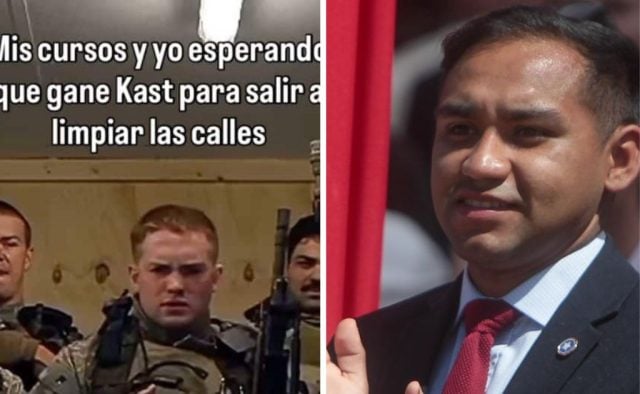Original article: Organizaciones de DD.HH. denuncian que llamado de Sebastián Zamora a “limpiar las calles” revive lógicas de “enemigo interno”
Human Rights Groups Condemn Sebastián Zamora’s Call to «Clean the Streets» as a Revival of Internal Enemy Mentality
A strong backlash and warnings concerning democratic integrity followed the recent social media post by elected deputy Sebastián Zamora, where he urged supporters to «go out and clean the streets» should the Republican José Antonio Kast come to power.
Human rights organizations expressed concern, cautioning that such rhetoric revives the mentality of an «internal enemy» that led to past dictatorships in Chile and across Latin America.
The controversy ignited when Zamora, who was elected as an independent under the Republican Party’s banner for District 7 in Valparaíso, shared a video on his personal Instagram from the account polilla.chile and republikastdechile. The post featured a scene from the movie *Warfare*, depicting men in military gear carrying weapons, accompanied by the caption: «My courses and I waiting for Kast to win so we can go clean the streets.» The content remained on his profile for about 14 hours before being deleted.

Following the ensuing controversy, the original posting account also deleted the video.
Concern and Rejection from Human Rights Organizations
In response to this incident, the National Network of Survivors of the Social Outbreak and the United Corporation for Human Rights Defense released a public statement expressing their «deep concern and rejection» of Zamora’s post.
«Such messages, especially from democratically elected officials, threaten social coexistence, democratic stability, and the upholding of human rights in Chile,» they asserted.
They further noted that Zamora’s call undermines international standards set by the UN and the IACHR, which call for authorities to «avoid speeches that incite violence or stigmatize the population». They emphasized that, although the video was deleted, «its dissemination is an irresponsible act and a troubling signal for our democracy.»
Sebastián Zamora and the Pío Nono Case
The statement also addressed Zamora’s past as a former police officer, who was acquitted in July 2024 of the Pío Nono case, where he was accused of attempted homicide following the fall of a 16-year-old boy from approximately 7.4 meters into the Mapocho River during protests after the social outbreak in 2020.
«It is particularly serious for such statements to come from someone directly involved in the Pío Nono case, which exemplifies the extreme violence of police actions during public demonstrations,» the organizations claimed.
While they acknowledged Zamora’s acquittal in that case, they described it as «a painful reminder of the urgent need to protect the human and social rights of individuals and to review and reform police institutions.»
The «Internal Enemy» and Justification of Crimes
In their statement, the groups drew direct connections between the language used by Zamora and the darkest episodes of Chilean history.
They warned that calls to ‘clean the streets’ have historically been employed to justify political persecution and institutional violence.
«These speeches vividly remind us of the opposition’s messages before the 1973 coup in Chile and throughout the other Latin American dictatorships, which systematically appealed to an alleged ‘internal enemy’ to legitimize the grave crimes they committed,» they argued.
In light of this scenario, they urged citizens to remain vigilant and for authorities to promote dialogue and respect.
«Chile cannot repeat that path. Our democracy demands authorities who foster dialogue and respect for every individual, not irrational confrontation, violence, or threats. We call upon the public to stay alert, to strengthen historical memory, and to defend a country where speeches that legitimize repression or the militarization of public life are never normalized again. Because dignity, justice, and democracy require daily care,» they affirmed.
«Truth, justice, reparations, and guarantees of non-repetition always,» they concluded.

